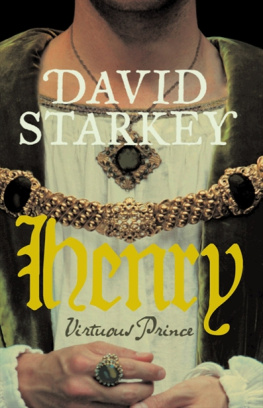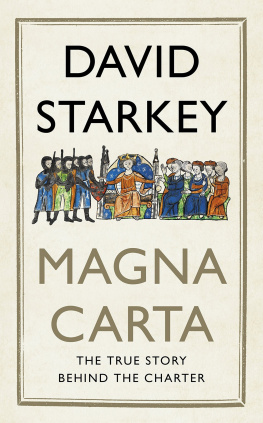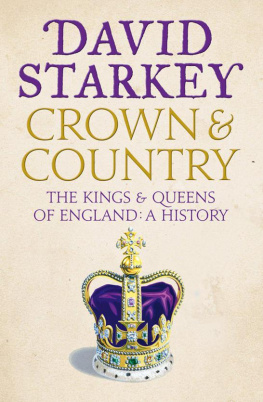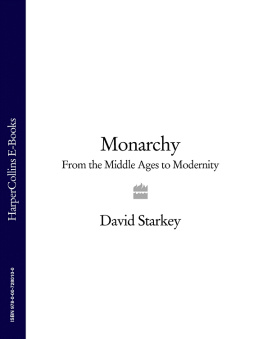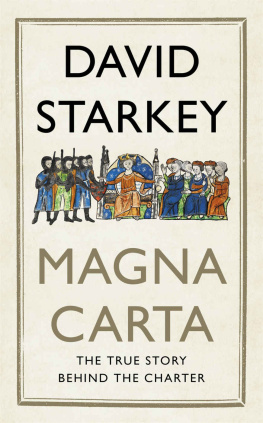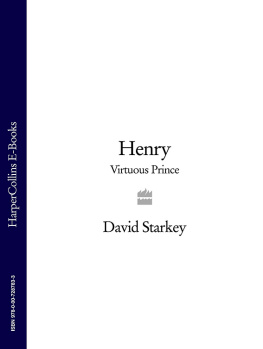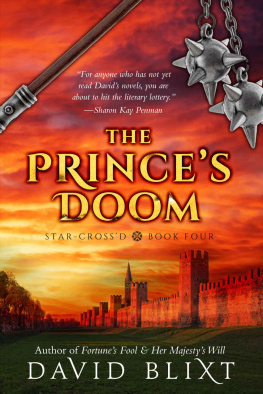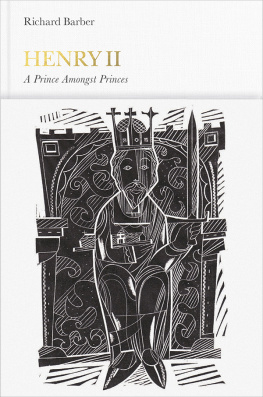David Starkey - Henry: Virtuous Prince
Here you can read online David Starkey - Henry: Virtuous Prince full text of the book (entire story) in english for free. Download pdf and epub, get meaning, cover and reviews about this ebook. year: 2008, publisher: HarperCollins, genre: Non-fiction. Description of the work, (preface) as well as reviews are available. Best literature library LitArk.com created for fans of good reading and offers a wide selection of genres:
Romance novel
Science fiction
Adventure
Detective
Science
History
Home and family
Prose
Art
Politics
Computer
Non-fiction
Religion
Business
Children
Humor
Choose a favorite category and find really read worthwhile books. Enjoy immersion in the world of imagination, feel the emotions of the characters or learn something new for yourself, make an fascinating discovery.
- Book:Henry: Virtuous Prince
- Author:
- Publisher:HarperCollins
- Genre:
- Year:2008
- Rating:5 / 5
- Favourites:Add to favourites
- Your mark:
- 100
- 1
- 2
- 3
- 4
- 5
Henry: Virtuous Prince: summary, description and annotation
We offer to read an annotation, description, summary or preface (depends on what the author of the book "Henry: Virtuous Prince" wrote himself). If you haven't found the necessary information about the book — write in the comments, we will try to find it.
Henry: Virtuous Prince — read online for free the complete book (whole text) full work
Below is the text of the book, divided by pages. System saving the place of the last page read, allows you to conveniently read the book "Henry: Virtuous Prince" online for free, without having to search again every time where you left off. Put a bookmark, and you can go to the page where you finished reading at any time.
Font size:
Interval:
Bookmark:

Australia
HarperCollins Publishers (Australia) Pty. Ltd.
25 Ryde Road (PO Box 321)
Pymble, NSW 2073, Australia
http://www.harpercollinsebooks.com.au
Canada
HarperCollins Publishers Ltd.
55 Avenue Road, Suite 2900
Toronto, ON, M5R, 3L2, Canada
http://www.harpercollinsebooks.ca
New Zealand
HarperCollinsPublishers (New Zealand) Limited
P.O. Box 1
Auckland,New Zealand
http://www.harpercollinsebooks.co.nz
United Kingdom
HarperCollins Publishers Ltd.
77-85 Fulham Palace Road
London, W6 8JB, UK
http://www.harpercollinsebooks.co.uk
United States
HarperCollins Publishers Inc.
10 East 53rd Street
New York, NY 10022
http://www.harpercollinsebooks.com

H ENRY, SON OF H ENRY VII and Elizabeth of York, was born on 28 June 1491 at Greenwich, the royal manor on the south bank of the Thames some five miles to the east of London. He was their third child and second son, and he was christened in the adjacent church of the Friars Observant by Richard Foxe, then bishop of Exeter, lord privy seal and one of his fathers leading ministers.
These bare facts are all that has been known hitherto about Henrys birth. But somehow they have never seemed quite enough. Fortunately, another piece of evidence has turned up which makes clear that Henry was christened with all the pompous ritual laid down in the handbook of court protocol, known as The Ryalle Book.
How really could it have been otherwise?
The christening, like most of the ceremonies of the Tudor court, combined the sacred with the secular. And each reinforced the theatricality of the other. First a stage was built, consisting of a tall circular wooden platform with tiers of steps and a central iron post. The assisting clergy stood on the lower steps, leaving the upper step and the reinforced top, with the massive silver font in its centre, free for the stars of the show: Bishop Foxe and Henry.
And heaven help any officious priest or deacon who spoiled the view!
Next, the Tudors love of rich, many-textured fabrics came into play. These were the principal source of decoration in a court that was always on the move: they could transform a bare and empty chamber in a long unlived-in palace in an hour or two; they could also turn, equally briskly, the plain box of the Friars church into a setting worthy of the prince that Henry was to be. In charge of these fabrics were the specialist staffs of the royal wardrobes, who now took over.
Benjamin Digby, yeoman of the queens wardrobe of the beds, and his men covered the wood and iron of the platform with gaily coloured cloth; hung a fringed and embroidered cloth-of-gold canopy over the font from line or cords; lined and wrapped the font with fine linen or lawn and trimmed its edge with a sheer, almost translucent stuff known as Cypress from its original place of manufacture. Finally,
The stagery complete, the performance could begin. Henry was undressed in the traverse or tent-like green room, where more Cypress had been used to cover and draught-proof the adjacent windows. Then Foxe gave him his name and plunged him bodily three times into the waters of the font. Even this had been stage-managed, as the water had been gently warmed beforehand so as not to shock Henry and make him spoil the show by crying.
A new Christian had entered the world, and a new royal prince was ready to take his place in the firmament. Trumpets sounded, the attendants lit their torches, the heralds put on their gold-embroidered tabards and Henry, wrapped in a mantle of cloth-of-gold furred with ermine and clutching a decorated and lighted candle in his hands, was carried in triumph in a burst of light and sound.
Henry had come into the world on a stage; he would live on one and die on one.
Not, it must be admitted, that anybody at the time took much notice.
No chronicler, herald or contemporary historian gave the event more than a passing and usually retrospective mention. None of his fathers poets laureate was inspired to commemorative verse. Even his grandmother, Lady Margaret Beaufort, only noted the bare details of his birth in
How did it come to pass that the Tudor who would make most noise in the world should enter it so quietly and almost unobserved? Partly it was a matter of accident: Henry happened to be born at the wrong time and in the wrong place. It was high summer, and most people who mattered were about to leave stinking, plague-ridden London for the country delights of the Long Vacation. Nor did Greenwich help. Still officially known as Placentia or Pleasure in medieval Latin, it was a semi-private riverside retreat, more the queens than the kings and emphatically off the beaten track.
Nevertheless, intention came into it as well. That Greenwich was used for Elizabeth of Yorks confinement in the first place suggests that a decision had already been taken to downplay the event. For Henry was the wrong baby to attract attention anyway. In the fullness of time he would be a royal star, effortlessly drawing all eyes and becoming the prime mover of the political cosmos and the axis round which English history turns. Then, he was only the spare and not the heir.
And the spare did not matter or, at least, did not matter very much.
But there is a paradox, as there will be so often in Henrys story. What made Henry relatively unimportant to others, including his own parents, was supremely important to him. For his status as second son was to condition almost everything about his first dozen years: his upbringing, his education, his relationship with his parents and his siblings, his attitude to women, even where he was brought up.
In short, in so far as the Henry we know was a product of nurture rather than nature, that nurture was determined by his also-ran place in the family pecking order.
On the other hand, of course, all this matters to us and indeed to Henry only because in circumstances unimaginable, or at least unimagined, at the time of his birth, Henry was to become the eldest surviving son.
And that changed everything for England as well as for Henry.
. LP IV iii, 5791.
. K. Staniland, The Royal Entry into the World, in D. Williams, ed., England in the Fifteenth Century: Proceedings ofthe 1986 Harlaxton Symposium (Woodbridge, 1987), 299, n. 8; AR I, 3046, 3338. Collectanea IV, 17984. The Ryalle Book itself is discussed by D. Starkey, Henry VIs Old Blue Gown: The English Court under the Lancastrians and Yorkists, TheCourt Historian 4 (1999), 128.
. TNA: E 404/81/1 (1 September 1491).
. For instance, in The Great Chronicle, 248, the entry concerning Henrys birth is not only an insertion, made long after the event (This year on Saint Peters Day in June was borne Henry, duke of York, the kings second son which reigned after him), it also appears under the wrong year. The Beaufort Hours, 279, notes Henrys birth only with the bare date; in contrast, for both Arthur and Margaret, the place and the exact hour of birth are given as well.

A MONG H ENRYS EARLIEST MEMORIES were stories of his own turbulent family history. Some probably came from the horses mouth of his parents and relations, and especially his mother; others formed a staple of the teaching of his first boyhood tutor, the poet John Skelton.
Font size:
Interval:
Bookmark:
Similar books «Henry: Virtuous Prince»
Look at similar books to Henry: Virtuous Prince. We have selected literature similar in name and meaning in the hope of providing readers with more options to find new, interesting, not yet read works.
Discussion, reviews of the book Henry: Virtuous Prince and just readers' own opinions. Leave your comments, write what you think about the work, its meaning or the main characters. Specify what exactly you liked and what you didn't like, and why you think so.

